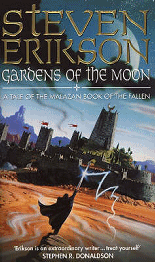 From a thread criticizing Steven Erikson. This is my comment.
From a thread criticizing Steven Erikson. This is my comment.
—
I’m weirdly expecting to love deeply Erikson, but I still haven’t read it.
But I’ve read an infinite amount of forums thread and reviews that I almost feel like I know his books better than some readers who dabbed it.
What is interesting is that he IS the author to hate or love. While you usually find some consensus about other authors (Jordan can be hated or loved as well, but there’s consensus about his best books, his flaws and so on), with Erikson you can read everything, and then the opposite.
So in a comment you read that his characters are cardboard cutouts, and in another that his characters are wonderful, each perfectly defined, with his flaws and everything. Some say that characters are his weakest point, and some say that characters are his main strength.
Sometimes, I also figured out the consensus. For example this problem about comparing him to D&D.
I’ve figured out that this isn’t because of the language used or the target of the novels, but mostly because of a “deux ex machina” approach.
For example, with Martin you have a story about men against other men. Political struggles, factions pitted one against the other. So the plot develops depending on its premises.
Whereas Erikson has what in MMO you call “power differential”. The world is more permeated with magic. Men aren’t all alike. This is why Erikson is compared to the Iliad. Gods walk along men, the power of certain guys is much greater than a pawn. There are interests and plots playing at different levels.
For some readers this “breaks the rules”. Because there are “deux ex machina” characters that are too powerful and so bend the plot without respecting the implicit rules within the plot itself. While for other readers this is the FUN. Because it’s extremely interesting to watch the relationships, behaviors and consequences when these different powers meet. The fireworks! To watch how men fuck the much greater powers, to see the cards on the table being thrown in the air and so on.
So for some readers this resembles to D&D in the sense that it’s in the D&D that you have those normal peons in the village who run the farm, and then the 20th level warrior who has a shitton of health points. Or the mage who can split the earth in two.
Where Martin deals with characters and plots that all sit on one level, all intertwined together (that’s why they call him master of weave), Erikson does something similar, but on the vertical level. Where a lot depends of how much you (the POV) know. Because the cards on the table never stay the same and you constantly discover something that makes you reconsider the whole thing. There’s always someone who knows more, there’s always something lurking in the shadows of the knowledge that is plotting behind your shoulders. And who believes to be leading, is instead lead.
It’s like Martin is the master of x-axis and Erikson master of y-axis. And what you like depends a lot on your preferences, and then expectations.
This is something I think I figured out. What I haven’t figured out instead is how to rate Erikson as a *writer*. Not the quality of plot or characters. Just the writing itself (skipping the first book).
Some say that Erikson is comparable to Martin, some say he’s a notch below but still at the very top of the genre, some say he’s not even comparable.
So, for those of you who think Martin is a much better writer, who are those writers that you would comprise between them?